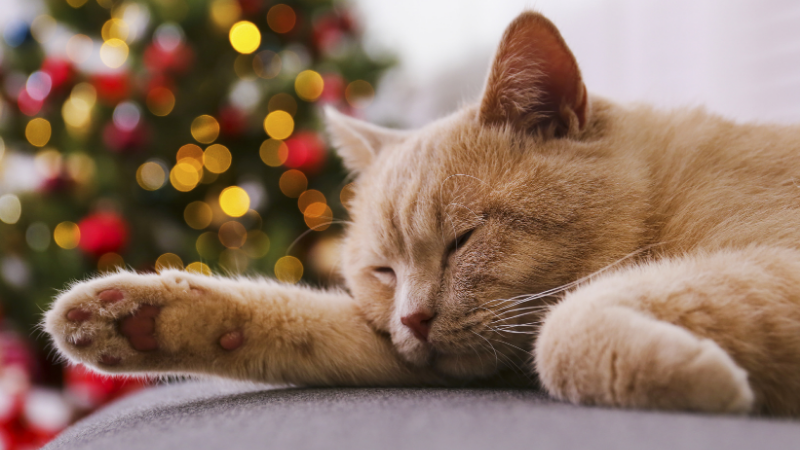
Holiday decorations. Baking favourite treats. Visiting friends and family. While you may love everything the holidays have to offer, pets can get really stressed out. Help your pet enjoy a stress-free holiday by incorporating these tips into your daily routine as you prepare for all the excitement.
Create a safe haven space
Look at your pet. No, really look at your pet. What do they look like when they are happy? How about anxious or scared? Are ears sitting forward, sideways, or backward? Is the tail wagging high and lively or low and slow? Are their eyes looking at you with love and curiosity or turned away so you see the whites of the eyeballs? Body language cues suggestive of stress are your cue to intervene and help your pet find a safe place away from holiday activity.- Where does your pet like to spend quiet time? Using a crate or bedroom as an escape from visitors is ideal. Offer food and water dishes and add a litter box for cats. Remember that locked crates and closed doors can increase anxiety for some animals. Experiment with baby gates and other barriers that prevent physical interaction but allow visual contact with family members in these situations.
- Pheromones are chemicals sensed between individuals of the same species to communicate things are okay. Synthetic pheromones are available as sprays, room diffusers, collars, and wipes. Remember that synthetic pheromone products are cat- or dog-specific. Be cautious with calming essential oils that may actually be toxic, especially for cats.
- Play soft music (dogs like soft rock and reggae; cats like nature sounds) or white noise (such as a fan on a medium setting) to create a soothing environment away from party sounds.
- Develop independence using food puzzles, Kongs filled with frozen treat paste or canned food, favourite toys, and nose work games. Try different approaches to see how long they keep your pet busy before you have guests in the home.
During the holidays
- Maintain or increase pet activity schedules. Exercise increases endorphins for both you and your pet, so you are both less stressed.
- Keep pets away from the door. Avoid escaping cats and dogs by greeting your guests without animals underfoot. Teach pets to wait on a mat or chair across the room with their favourite food puzzle or toy while new people are coming into the home. This technique also helps decrease the crazy barking that comes with arriving visitors.
- Consider pressure garments or bandage wraps. During parties or other busy times, this technique acts to “hug” your pet when you cannot. While rare, wraps may increase anxiety and become a strangulation hazard if your pet panics while left unattended. Have your pet practice wearing the garment at bedtime in the weeks before the holidays to create positive associations.
- Consider anti-anxiety supplements. Nutraceutical supplements recommended by veterinarians are generally geared toward promoting the “just relax” brain chemical, serotonin. These products can help reduce stress in a mildly anxious pet. Most supplements take at least 4-6 weeks before full effect, so consult your veterinarian early for best results.
- Short-term prescription medications are available through your veterinarian. For pets with more severe anxiety, you may need a customized plan. The doctor may recommend a trial dose to see how your pet reacts to any given product. Veterinarians want to see a pet who is relaxed but not drowsy. Book an appointment as soon as possible to discuss which options are best for your pet.
